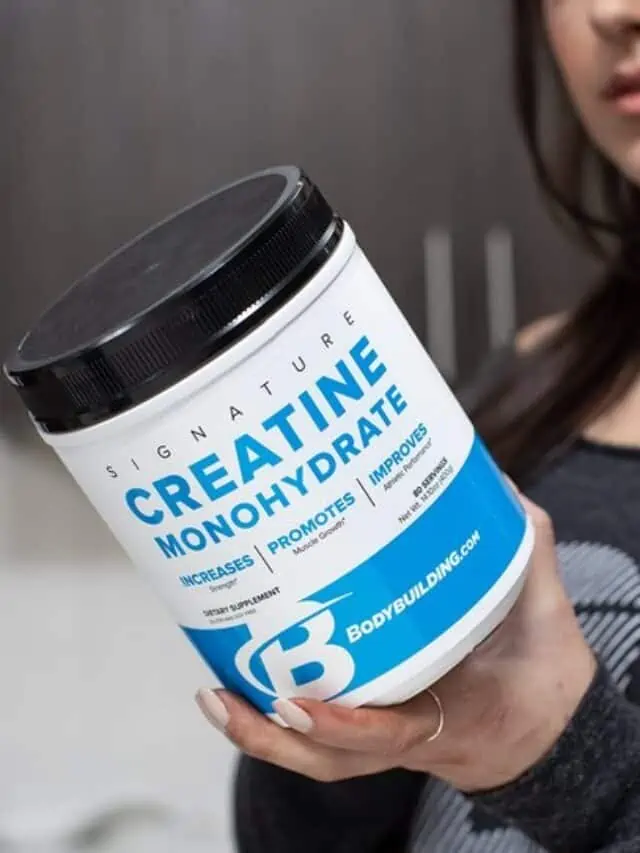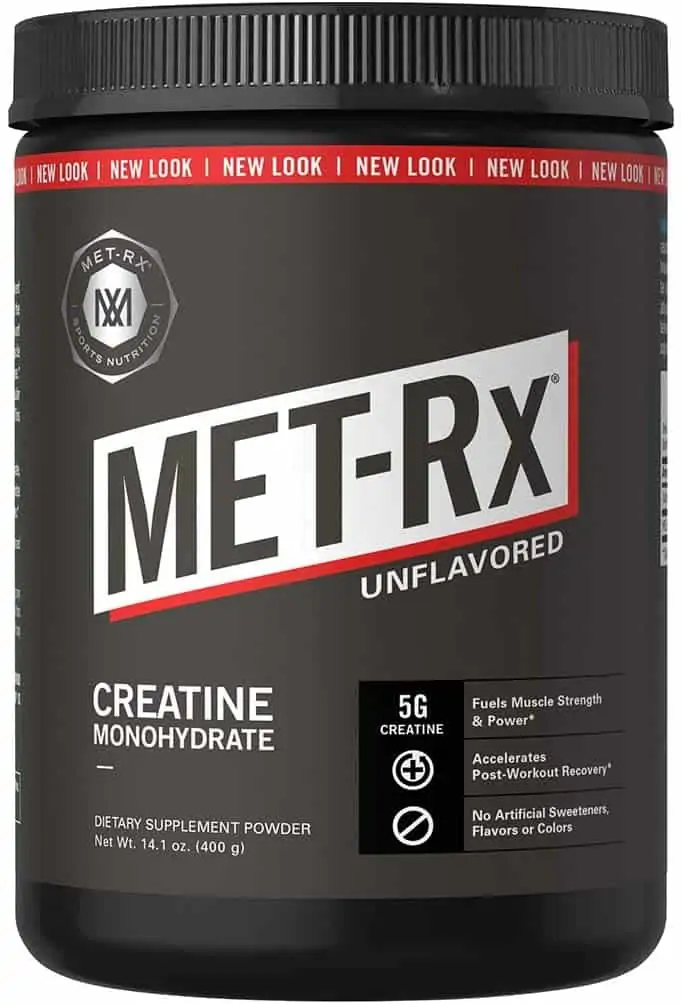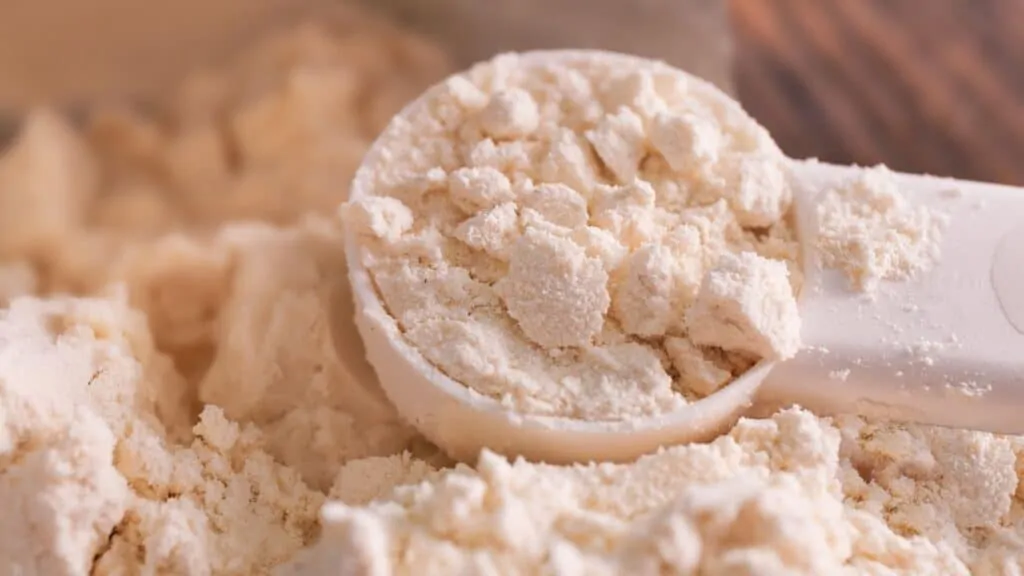Creatine Powder is one of nature’s most potent performance enhancers and muscular endurance boosters. This article will give you all the information you need about this supplement to help you get maximum benefits when taking creatine supplements.
Creatine can be found naturally in food sources like meats and dairy products. However, if your diet lacks adequate amounts of Creatine, then supplementation may be necessary.
Creatine has improved physical performance by making people stronger, more powerful, faster, quicker to react, and with more stamina overall.
The human body stores creatine phosphate in muscles, which is 95 percent creatine. The rest is in your brain, kidneys, and liver.
Interesting Read
Collagen Powder Ultimate Benefits and 9 Best Selling in 2021
How to Boost Metabolism after 40? 15 Simple Life Style Changes
11 Best Unflavored Protein Powders in 2021- Inexpensive but Better
How does Creatine work?
Firstly, Creatine works by helping muscles produce more ATP (Adenosine triphosphate) during exercise. When we perform physical activity, our bodies break down glycogen stores within cells. Glycogen is stored in the liver and muscles.
During intense workouts, these tissues are depleted of their glycogen reserves. As they run out of fuel, they break down other substances, including proteins. These breakdown products include amino acids, which become substrates used to create new molecules. One of those molecules is ATP.
Why is Creatine important?
Creatine is an essential nutrient found naturally in meats, dairy products, eggs, vegetables, fruits, nuts, seeds, beans, legumes, whole grains, and soybeans. It plays a role in maintaining healthy bones and teeth, aids in fat metabolism, improves sports performance, and boosts mental alertness.
Potential Benefits of Creatine Supplementation
Taking creatine supplements has been shown to help:
- Boost your exercise performance during aerobic exercise or any other high-intensity exercise.
- Aid in post-workout recovery.
- It prevents muscle cramping and injuries.
- Aid athletes tolerating high workloads
- During training, you gain lean muscle mass.
- Vegetarians may benefit more as they have less intramuscular creatine storage.
- It reduces dehydration, muscular tightness, sprains, and total injuries.
- Degenerative illnesses such as muscular dystrophy, Parkinson’s and Huntington’s disease, diabetes, osteoarthritis, fibromyalgia, metabolic or transport problems, ageing, brain health, and heart ischemia may benefit from taking creatine supplements.
Can I take Creatine with other sports drinks?
If you’re buying creatine powder, check first what kind of sports drink it goes best with. For example, some people say Creatine doesn’t mix well with Gatorade, but others claim it mixes perfectly well. You’ll want to try mixing them yourself before making up a batch of creatine powder.
You can mix creatine powder with water to create a paste, then add sugar and flavoring. If you want something sweeter, try mixing Creatine with fruit juice. Some athletes prefer to use Creatine mixed with Gatorade because it contains electrolytes.
Coffee and Creatine seem to have no detrimental impact on athletic performance and may even improve power and strength. The downside is that they may increase the risk of diarrhea and dehydration.
How much Creatine should I consume per day?
A typical adult needs around 5 gm of Creatine daily. This amount varies depending on age and gender. Women generally require less than men. Athletes who train hard and lift heavy weights need more Creatine than those who don’t exercise regularly.
To gain muscle, take 20 gm of Creatine per day for a few weeks. You can take this in smaller doses of 5gm at four different times during the day. It is called loading. Loading helps to saturate muscle cells with Creatine and get its advantages quickly. To feel the benefits of Creatine, your muscles must be completely saturated for 5–7 days.
Secondly, reduce it to 3–5 gm per day, termed a maintenance dose.
In some cases, individuals may experience bloating during the loading phase. You can either reduce the loading phase dose or start directly with the maintenance dose in such cases. It will only result in slightly more time for getting the desired results, maybe a couple of weeks extra.
Myths associated with Creatine Consumption
Creatine has many myths regarding adverse effects associated with it. So much so that some claim creatine is an anabolic steroid and should not be consumed by women or teenagers. Creatine causes dehydration and cramps. Creatine causes harm to the liver and results in poor kidney function. Creatine causes digestive issues and diarrhoea.
The biggest of all the misconceptions is, “Protein causes hair loss.” Not enough research has been done on this aspect, though whatever research has happened doesn’t confirm this.
But as mentioned above, all these are just myths.
If consumed within the recommended dosage, it does not cause any digestive issues. If you are taking any prescription drugs, do consult before taking Creatine.
It does raise creatinine if consumed above the recommended dosage, but the same is excreted through urine.
Potential side effects?
As long as you don’t overdose on Creatine, there should be no adverse side effects associated with its consumption. Many athletes report feeling better after using Creatine because it gives them extra energy.
Despite being deemed safe, if taken in higher doses than specified, you may get the following side effects.
Side effects include stomach upset, headaches, nausea, dizziness, heartburn, constipation, insomnia, and dehydration. These symptoms usually go away after about three weeks.
Do not take Creatine if you have kidney or liver issues or diabetes. Consult your doctor if you are taking any medicine.
Does Creatine cause weight gain?
By itself, Creatine has zero calories, so it has zero effect on fat. It does help you work harder during your gym visits. It does cause weight increase in terms of muscle growth, but not fat.
Creatine does help with muscle buildup, and more muscle means more calories burned. But during muscle building, most bodybuilders are in a calorie surplus. So it usually causes weight gain, but healthy weight gain in the form of muscles.
Is Creatine safe for children?
Children do benefit from creatine supplementation, but caution is needed. Children who are under 18 years old must get their nutrients through food sources. It means that parents should monitor their children’s diet closely when giving them Creatine.
Why should I avoid using Creatine during pregnancy?
Pregnant women shouldn’t use Creatine because there haven’t been enough studies to know how safe it is. However, pregnant women have used Creatine safely without any negative consequences.
Should I be concerned if I’m allergic to Creatine?
People who suffer from allergies to certain substances often experience adverse reactions when exposed to them. For example, someone with a peanut allergy would likely react badly to eating peanuts. Similarly, someone who suffers from a shellfish allergy might feel ill after consuming shrimp. Because Creatine causes no known allergic reaction, however, this isn’t a concern.
Do I have to be an athlete to benefit from Creatine?
Not necessarily. Anyone can benefit from Creatine. Even nonathletes can improve performance by consuming Creatine.
Should I mix my creatine powder with water before drinking it?
Mixing creatine powder with any liquid isn’t necessary. Just add one teaspoon of powdered Creatine to 8 ounces of cold water. Drink immediately after mixing.
Which Creatine works best?
There are several different types of creatine products out there. Each one offers slightly different benefits. For example, creatine monohydrate tends to provide more significant strength gains than creatine ethyl ester.
Best Selling Creatine Powders
ON Micronized Creatine Monohydrate Powder
- Serving Size-5 gm
- Creatine Monohydrate-5 gm
- Other Ingredients-None

Optimum Nutrition Micronized Creatine Monohydrate Powder contains five gm of pure creatine monohydrate per serving. The creatine powder utilizes CreapureTM, a purified and potent form. Micronized creatine has smaller powder particles that combine well with water. It is an excellent value supplement. All goods are thoroughly screened for prohibited substances and tested for purity and safety.
No scooper is included with creatine powder. There is just one unflavored bulk powder. Despite being a tasteless and odourless powder, some individuals dislike the flavour. To prevent muscular cramping, drink enough water to dissolve the creatine powder completely.
Optimum Nutrition’s creatine monohydrate powder provides results. Unflavored, you may add it to protein shakes without affecting the taste. It’s a fantastic pre-and post-workout supplement.
Thorne Research – Creatine – Creatine Powder
- Serving Size-5 gm
- Creatine Monohydrate-5 gm
- Other Ingredients-None

Thorne Research Creatine is high-end creatine. It contains 5 gm of Creapure®, the finest form of creatine monohydrate. The most extensively researched creatine
Thorne Research is thorough in its product development and testing. They not only find the best materials but also test them four times. Thorne Research also creates exclusively GMO-free goods that are free of gluten and other allergies. Final assembly occurs at third-party-certified facilities in the USA.
This creatine is ideal for athletes as it is NSF Certified for Sport. Thorne Research Creatine is one of the finest creatine monohydrate supplements money can buy.
Nutricost Creatine Monohydrate Micronized Powder
- Serving Size-5 gm
- Creatine Monohydrate-5 gm
- Other Ingredients-None

Unflavored With just one ingredient, this is the supplement’s most frequently used and researched version.
It includes no artificial chemicals or sweeteners. No high-glycemic carbohydrates to help get Creatine to the muscles faster. It’s micronized, making it easier to distribute in water than regular creatine monohydrate.
This one isn’t third-party tested. It’s non-GMO and gluten-free, but that’s about it. It’s simple Creatine, and you get what you see. It’s also quite inexpensive. It’s smooth yet unflavored. It is the most basic creatine supplement on the market.
BulkSupplements.com Monohydrate Creatine Powder
- Serving Size-5 gm
- Creatine Monohydrate-5 gm
- Other Ingredients-None
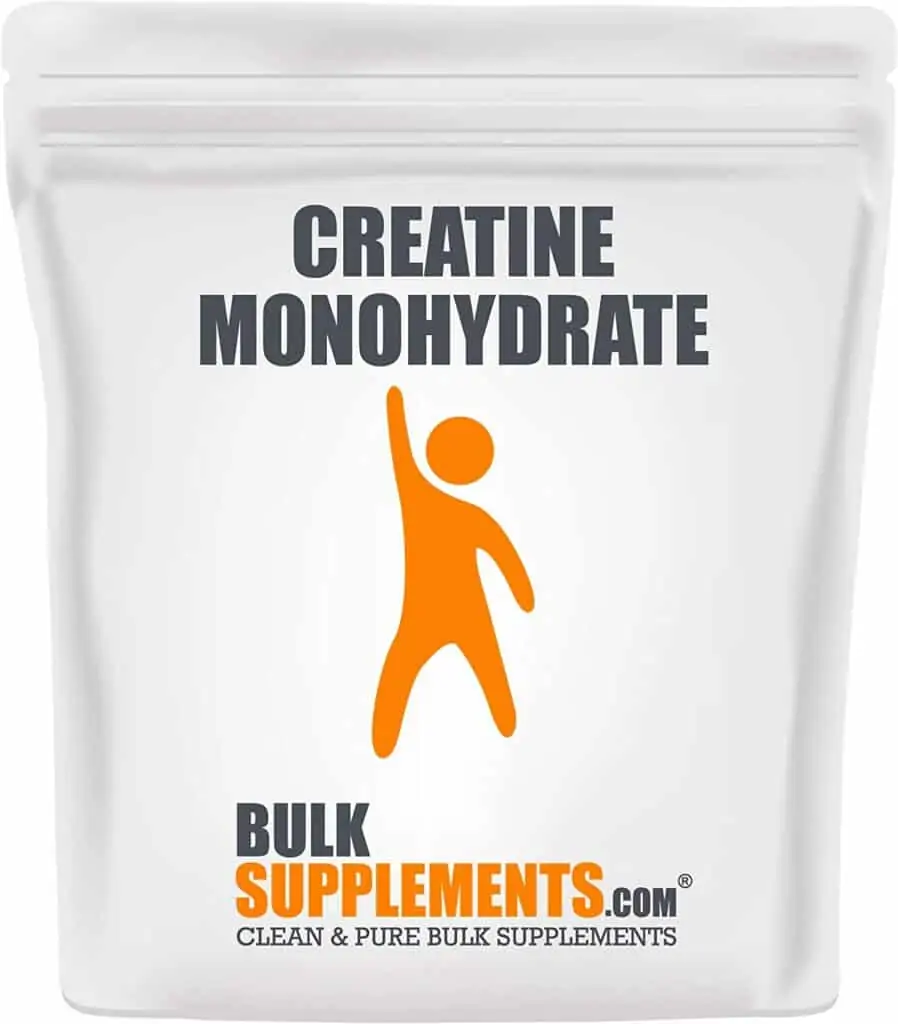
This product includes no artificial or natural sweeteners. Its creatine monohydrate is allergen-free and has a GMP certificate. The powder is micronized to make it more water-soluble.
Notably, the product is not third-party tested. It doesn’t come with a scoop. Each serving is 2 1/2 gm, not 5 gm like other brands.
Overall, this is an excellent product that many people find effective. The greatest flaw is the absence of third-party testing.
MuscleTech Cell-Tech Monohydrate Creatine Powder
- Calories-140
- Serving Size-49 gm
- Creatine Monohydrate-5 gm
- Carbs-36 gm
- Vitamin C-125 mg
- Vitamin B6-5.3 mg
- Vitamin B12-0.2 mg
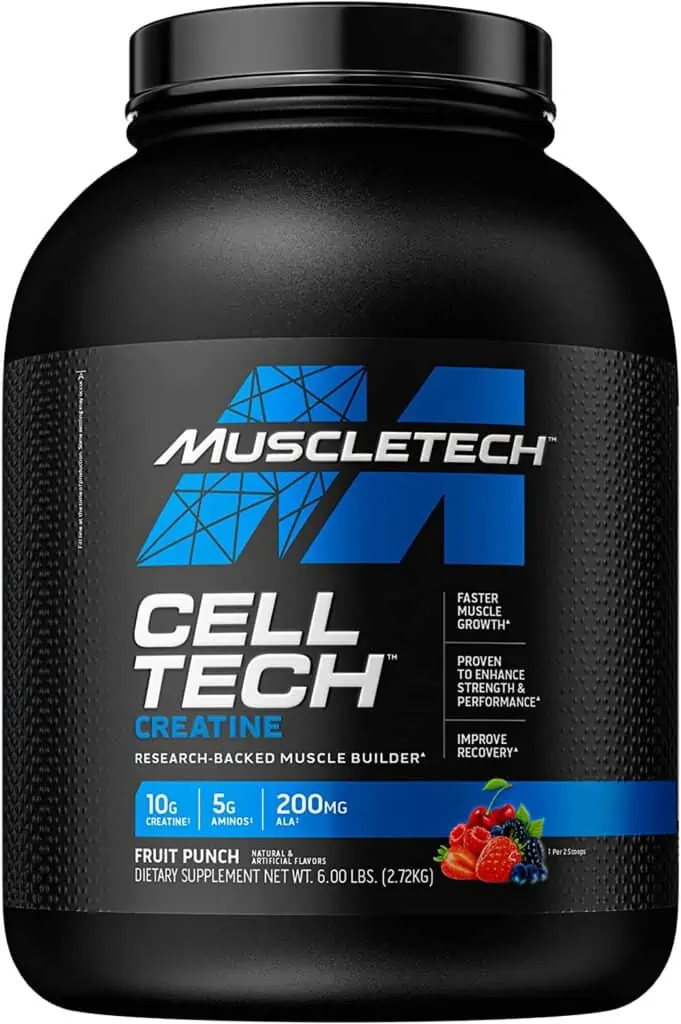
Cell-Tech is a 3rd generation creatine solution containing a combination of creatine, carbohydrates, and amino acids. The 5g of HPLC-certified creatine monohydrate per scoop helps decrease recovery time between sessions, increase strength and develop more lean muscles.
Muscle Tech’s Creatine Powder comes in a variety of flavours, including orange, grape, and fruit punch. Creatine is naturally present in muscle cells and helps muscles recover after hard lifting or HIIT activity. It also has 1 gram of BCAAs, which are used by athletes to improve performance and decrease tiredness.
MuscleTech Cell-Tech Creator Creatine HCl Powder
- Serving Size-2 gm
- Creatine Hydrochloride-750 mg
- Free Acid Creatine-750 mg
- Sodium-10 mg

CREATINE POWDER Creatine Creator contains pure free-acid creatine with no fillers, carbohydrates, or lipids.
The Creator increases muscular strength, growth, and performance. This compound boosts your muscles’ capacity to replenish ATP, their main source of anaerobic energy.
Cell-Tech Creator provides ultra-pure, free-acid creatine, so you never have to load or cycle it. It stacks nicely with BCAAs and pre-workouts.
Kaged Muscle Creatine HCl Powder
- Serving Size-750 mg
- Creatine Hydrochloride-750 mg

It’s called C-HCl, and the serving quantity is very small, only 750mg per 100 pounds of bodyweight. One scoop includes 750 mg of creatine hydrochloride, patented by Kaged Muscle.
Other components include natural flavours, stevia, and sucralose (Splenda®). There are sulfites in this product. However, they are extremely small amounts. Not to mention, it is easy on the stomach. Theoretically, since creatine HCl absorbs better in the stomach, we need less to have the same effects.
It’s simpler to digest, Informed Choice tests it for prohibited chemicals and contaminants, and it’s produced in a GMP facility, which means the FDA regulates it for quality. If you desire creatine HCl, there is an extraordinary level of quality control behind it. It’s third-party tested, produced in a GMP facility, and reasonably priced.
MET-Rx Creatine Powder
It enhances muscular strength. It enhances workout power and recovery. Strengthens and powers
Pure Creatine Monohydrate. For athletes, bodybuilders, and anybody seeking to maximize every exercise.
The daily intake of creatine will assist in supporting muscular strength, power, and healing after high-intensity activity. Creatine also increases muscle force, particularly during brief bursts of maximum activity. It may lead to more repetitions while lifting.
MET-Rx Creatine Monohydrate Powder contains creatine monohydrate, which improves athletic performance, strength, and power.
Cellucor Cor-Performance Creatine Monohydrate
- Serving Size-5 gm
- Micronized Creatine Monohydrate-5 gm
- Other Ingredients-None

Each scoop contains 5 gm of micronized creatine monohydrate. The remainder of the ingredients is mainly flavourings.
It contains the artificial sweeteners sucralose and acesulfame potassium, which some individuals avoid.
It is GMP compliant. It lacks extras like carbohydrates and BCAAs, plus it contains artificial chemicals, which may turn off certain consumers.
Conclusion
Creatine supplementation can effectively maintain the total creatine pool during a rehabilitation period after an injury and attenuate muscle damage induced by a prolonged endurance training session. In addition, it seems that Creatine can act as an effective antioxidant agent after more intense resistance training sessions.
Collectively, despite a few controversial results, it seems that creatine supplementation combined with resistance training would amplify performance enhancement in maximum endurance strength and muscle hypertrophy.


